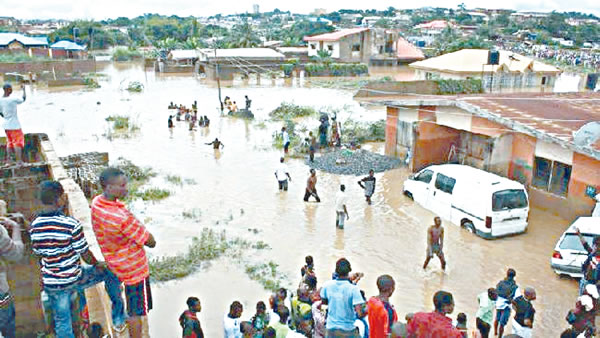Nigeria, Africa’s most populous nation and one of its largest economies, is grappling with profound challenges exacerbated by climate change. As the country experiences increasingly erratic weather patterns, rising temperatures and severe environmental impacts, the consequences are far-reaching, influencing unemployment, food security, migration and overall economic stability. CHRISTIAN APPOLOS, in this report, explores how climate change exacerbates these critical issues.
CLIMATE change presents a formidable challenge to Nigeria as it is with all the countries across the globe. Challenges may be slightly different but it all boils down to the handiwork of the notorious monster. Climate change exacerbates issues of unemployment, food security, migration and economic instability. The interconnected nature of these impacts underscores the need for a comprehensive approach to resilience and adaptation.

Unemployment, effect of climate-induced disaster
Unemployment in Nigeria is a pressing issue, exacerbated by multifaceted factors. Unfortunately, like an ailing grandma who arthritis newly joined the lists of her encumbrances, the impacts of climate change are worsening the worrying situation. The country’s heavy reliance on agriculture makes it particularly vulnerable to climatic shifts, which have significant repercussions for employment.
Statistics have shown that Nigeria is a heavily agriculture-dependent nation. And for a fact, agriculture employs a substantial portion of the country’s workforce with many subsisting on smallholder farms. Climate change induces erratic rainfall, prolonged droughts and flooding, directly affecting crop yields and other means of livelihood.
For instance, the northern region of the country, reliant on rain-fed agriculture, has seen decreased productivity due to prolonged droughts. Lower agricultural output leads to reduced incomes for farmers and agrarian workers, pushing many into unemployment.

In the South-South, South-East and some part of the North-Central regions, particularly in states like Bayelsa, Rivers, Anambra, Kogi, Kwara and Benue, flood is a notorious monster that regularly disrupts and destroys farming and its produce and residential houses. It also throws heavy blows at entrepreneurial economic activities and production of many goods and services.
The economic implications are unarguably ubiquitous and far-reaching. The effects of climate-induced agricultural failures ripple through the economy. With reduced agricultural productivity, food processing industries, transportation networks and trade are disrupted.
Businesses reliant on agriculture face diminished demand or increased operational costs, leading to workforce reductions. For instance, the collapse of agricultural enterprises definitely results in reduced labour demand in related sectors, such as logistics and food distribution, further contributing to job losses.
Also, the strain on agriculture often drives people from rural to urban areas in search of alternative livelihoods. This migration evidently overwhelms urban infrastructure and services, making it difficult for newcomers to find employment. Urban areas, already battling high unemployment rates, face increased competition for jobs and resources, exacerbating the overall employment crisis.
Food security: The struggle for sustenance
Food security is another critical concern in Nigeria. In fact, experts now regard it as an a-list menace. Like unemployment, climate change is exacerbating food crisis in Nigeria, increasingly making the availability and accessibility of food impossible for the citizens.
Currently across Nigeria, the agricultural sector faces reduced productivity due to changing rainfall patterns and rising temperatures. For example, regions like the North East have been hit hard by recurrent climate change induced droughts, diminishing crop yields and increasing food shortages. Staple crops such as maize, cassava and yams are particularly affected, leading to higher food prices and reduced availability.
The menace goes beyond limitation of food availability and accountability to affecting nutritional quality. “Climate change seriously affects the nutritional quality of food. Elevated CO2 levels can lower the concentrations of essential nutrients in key crops, impacting the health of the population. Nutrient deficiencies can exacerbate health issues, especially among vulnerable groups like children and pregnant women,” said Dr Mabel Oche, nutrition expert at Mpape Health Centre, Abuja.
In the same vein, the reduction in food supply due to climate change impacts drives up prices, making food less affordable for many Nigerians. This price volatility affects both urban and rural populations, leading to increased food insecurity. Rural areas, where people are heavily dependent on agriculture for their livelihoods, are particularly vulnerable, as they face both reduced income and higher food prices.
Migration: Displacement and its consequences
Also, climate change-induced displacement is a growing issue in Nigeria, with severe environmental changes prompting both internal and cross-border migration. In many regions in Nigeria, extreme weather events, such as flooding and droughts, displace communities.
For instance, flooding in the Niger Delta region and the Middle Belt has led to the displacement of millions. Internally displaced persons (IDPs) often face dire living conditions in camps or temporary shelters, where access to basic services and employment opportunities is limited. This displacement can strain local resources and exacerbate social tensions. In 2022 alone, about 2.4 million persons were displaced in Nigeria, according to the Internal Displacement Monitoring Centre (IDMC) report.
Climate change induced environmental degradation also drives cross-border migration. Many Nigerian communities facing severe droughts or desertification migrate to neighbouring countries in search of more viable living conditions. This cross-border movement, in most cases, leads to regional tensions and strain resources in host countries, impacting local economies and social structures.
As evidently seen across Nigeria today, many people from the rural populations are migrating to urban centres. This has led to increased pressure on infrastructure, housing and services in the cities. It is apparently exacerbating unemployment, worsening living conditions. The situation is straining the economic stability of cities in no small measure.
Economic instability: The broad spectrum of climate change impacts
Climate change has a profound impact on Nigeria’s economic stability, influencing various sectors and compounding existing vulnerabilities. Nigeria is currently experiencing significant economic losses from climate-related disasters. Notable is the 2022 floods that caused extensive damage to infrastructure, agriculture and homes, costing billions of naira in recovery and reconstruction. The financial burden of such disasters diverts resources away from development projects and essential services, hampering economic growth.
The climate change crisis is taking a heavy toll on Nigeria’s agricultural sector, which is very crucial to its economy. Decline in productivity due to climate change is so real that it affects food exports and the livelihoods of millions. With a significant portion of Nigeria’s GDP tied to agriculture, reduced productivity has broader economic implications, affecting trade balances and national income.
Climate change presently introduces risks that impact investment decisions in the country. According to Nigeria Employers Consultative Association’s (NECA) recent assessment: “Many investors view Nigeria as a high-risk environment due to the potential for climate-induced disruptions.” This perception can deter investment, affecting sectors such as infrastructure and energy that are vital for economic development. Lower investment levels can stifle job creation and economic expansion.
The health impact of climate change is another challenge Nigeria faces. The spread of vector-borne diseases and heat-related illnesses also affect economic productivity. “A less healthy workforce means reduced labour productivity and increased healthcare costs, further straining the economy. In a country with existing healthcare challenges, these additional burdens exacerbate economic instability,” says Comrade Eustace James, Senior Assistant General Secretary and Focal Person on Migration Governance, Nigeria Labour Congress (NLC).
Pathways to resilience and adaptation
“Addressing the multifaceted impacts of climate change in Nigeria requires a comprehensive approach that includes both immediate relief and long-term strategies for resilience,” says James.
He added: “Investing in climate-smart agriculture is essential for enhancing food security and livelihoods. This includes adopting drought-resistant crop varieties, improving irrigation techniques and supporting sustainable farming practices. Strengthening agricultural research and extension services can help farmers adapt to changing conditions and maintain productivity.”
“Developing robust disaster preparedness and response mechanisms can mitigate the impacts of climate-related disasters. Early warning systems, community-based preparedness programmes and improved infrastructure can help communities better respond to and recover from climate shocks. Policies are needed to manage both internal and cross-border migration effectively. This includes providing support for displaced populations, improving urban planning and fostering regional cooperation to address cross-border migration challenges.”
On his part, Comrade Eche Asuzu, National Coordinator, NLC Climate Change, Green Jobs and Just Transition Programme, said: “Diversifying Nigeria’s economy beyond agriculture can reduce vulnerability to climate change. Investing in sectors such as renewable energy, technology and manufacturing can create new job opportunities and enhance economic stability. Climate change is a global issue that requires international collaboration. Developed nations must fulfill their commitments to climate finance and technology transfer to support Nigeria’s efforts in building resilience and adapting to climate impacts.
“By investing in sustainable agricultural practices, improving disaster preparedness, supporting displaced populations and promoting economic diversification, Nigeria can work towards mitigating the adverse effects of climate change and fostering a more stable and prosperous future.”
READ ALSO: Gov Abiodun distributes 24,000 bags of fertiliser to Ogun farmers







